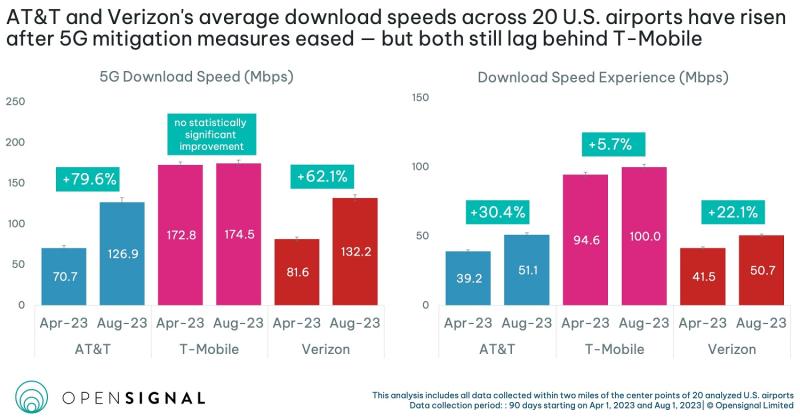Verizon executives have talked extensively about the remarkable impact they see in markets where their C-band spectrum has rolled out. But new data published by Opensignal puts an exclamation mark on it all.
Wireless carriers, including Verizon and AT&T, were limited in how much C-band they could deploy around airports due to the aviation industry’s concerns that it would interfere with their outdated altimeter equipment. That led to delays or mitigation techniques until the carriers were able to increase power levels on C-band around airports this past summer.
Opensignal studied the impact of the new spectrum once it was made available around airports and compared it to a prior collection period. The results?
“Our users on AT&T and Verizon enjoy stunning boosts in their average 5G download speeds after August 1, 2023 – compared to the period before July 1, 2023 – of 79.6% and 62.1%, respectively. Both surpass the 100 Mbps milestone around the airport areas and are in a statistical tie, with scores of 126.9-132.2 Mbps,” Opensignal said in a report released Wednesday.

T-Mobile has not seen any statistically significant changes in its 5G download speed scores around the 20 U.S. airports that were analyzed and made sure everyone knows of its status, putting out a press release saying how it delivers the most available 5G network, has the fastest download speeds and supplies the most consistent quality at the airports based on Opensignal’s data.
However, things are gradually changing. While T-Mobile still commands a “substantial” margin over its competitors, Opensignal said both AT&T and Verizon have whittled away at T-Mobile’s lead.
Before the frequency switchover, T-Mobile’s average 5G download speeds were 2.4 times faster than AT&T’s and 2.1 times faster than Verizon’s. After AT&T and Verizon were given the go-ahead to increase spectrum bandwidth and power levels around the airports, T-Mobile’s lead decreased to 32-37.5%, the report said.
Overall, the report shows that AT&T and Verizon have a lot of work to do to come close to T-Mobile at the majority of the 20 airports. But results can vary widely from airport to airport.
At Chicago O’Hare, AT&T comes in first for download speeds with a whopping score of 193.6 Mbps – which is around 3.6 times faster than what Opensignal users saw on T-Mobile and Verizon. Opensignal said AT&T’s speed at O’Hare is aided by its mmWave 5G deployments.
T-Mobile fared better at Dallas-Fort Worth International, the second busiest and in AT&T’s hometown. T-Mobile had a download speed score of 82.5 Mbps, around three times faster than AT&T and Verizon. T-Mobile also leads at Hartsfield-Jackson Atlanta International, the busiest airport in the U.S.
Verizon ranks first for download speed at Denver International, the third busiest airport in the U.S., with a score of 89.5 Mbps, 36.5%, faster than T-Mobile and 2.3 times faster than AT&T, according to the analysis.
